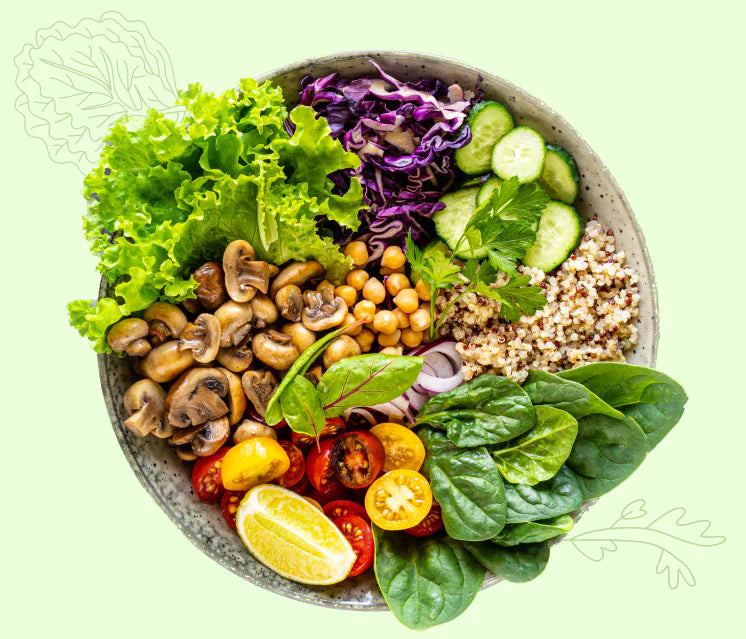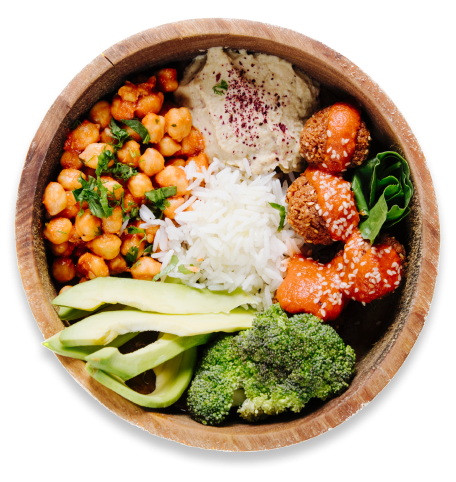Call Us 123456789
Free delivery on order over $200
Mastering Veganism: Your 30-Day Challenge to a Plant-Based Life
Buy meal plan
Introduction – Why Take the 30-Day Vegan Challenge?
Many people worry about missing their favourite foods, struggling with social situations, or not getting enough nutrients. However, transitioning to a plant-based diet doesn’t have to be restrictive or difficult. The 30-Day Vegan Challenge is designed to help you gradually adapt, making small, manageable changes that feel natural rather than forced.
So why take on this challenge?
There are three major benefits to going vegan:
- Health Improvements – A well-planned vegan diet can boost energy levels, improve digestion, lower cholesterol, and reduce the risk of chronic diseases such as heart disease and type 2 diabetes.
- Ethical Reasons – Choosing plant-based foods helps reduce animal suffering in factory farming industries.
- Environmental Impact – A vegan lifestyle significantly lowers your carbon footprint by reducing greenhouse gas emissions and water usage.
Over the next 30 days, you’ll explore new foods, learn to replace animal-based products with plant-based alternatives, and discover just how delicious and satisfying vegan meals can be. By the end of this journey, you’ll feel more confident about making plant-based choices that align with your health, values, and lifestyle.
Week 1: Understanding Veganism & Easy First Steps
Goal: Familiarise Yourself with Plant-Based Foods and Make Small Adjustments
The first week is all about learning the basics and making simple swaps. You don’t need to eliminate all animal products at once. Taking gradual steps will make the transition easier and more sustainable.
Days 1-3: Learn the Basics
Start by understanding what veganism is and how it differs from vegetarianism. A vegan diet eliminates all animal products, including:
- Meat (beef, poultry, fish)
- Dairy (milk, cheese, yoghurt)
- Eggs
- Honey
- Anmial-derived additives (such as gelatin and certain food colourings)
Instead, you’ll focus on whole, plant-based foods, such as:
- Fruits and vegetables
- Whole grains (quinoa, brown rice, oats)
- Legumes (lentils, chickpeas, beans)
- Nuts, seeds, and plant-based oils
- Dairy alternatives (almond milk, coconut yoghurt)
Days 4-7: Begin Incorporating Plant-Based Meals
Now that you know what foods to eat, it’s time to start making small changes.
- Swap dairy for plant-based alternatives – Replace cow’s milk with almond, soy, or oat milk. Try dairy-free cheese, yoghurt, and butter.
- Try one vegan meal per day – Start with breakfast—swap eggs for a smoothie, porridge, or avocado toast. Gradually increase plant-based meals throughout the week.
- Read ingredient labels – Some animal-derived ingredients are hidden in processed foods. Look out for terms like whey, casein, gelatin, and E-numbers linked to animal sources.
The key to success is not rushing the process. By making small, manageable changes, you’ll begin to see how easy and enjoyable plant-based eating can be.
Key Takeaway: Veganism isn’t about restriction. It's about exploring new foods and making sustainable choices. This week sets the foundation for a smooth and enjoyable transition.
Week 2: Building a Balanced Vegan Diet
Goal: Ensure Proper Nutrition While Exploring New Foods
Now that you’re incorporating more plant-based meals, it’s time to focus on nutrition. A common concern about vegan diets is whether they provide all the essential nutrients. The good news is that with a bit of planning, a plant-based diet can be nutritionally complete and balanced.
Days 8-10: Focus on Plant-Based Protein Sources
Protein is crucial for muscle growth, repair, and overall health. Thankfully, there are plenty of high-protein vegan foods to choose from:
- Legumes – Lentils, chickpeas, black beans, kidney beans
- Tofu & Tempeh – Excellent meat alternatives rich in protein
- Quinoa & Whole Grains – Unlike most grains, quinoa is a complete protein
- Nuts & Seeds – Almonds, walnuts, chia seeds, hemp seeds, pumpkin seeds
A great way to ensure you’re getting enough protein is to mix different plant-based sources throughout the day.
Days 11-14: Learn About Essential Nutrients
Certain nutrients require extra attention on a vegan diet. Here’s how to get them naturally:
- Vitamin B12 – Found in fortified plant-based milks, nutritional yeast, and supplements.
- Iron – Available in lentils, spinach, tofu, and pumpkin seeds. Pairing with vitamin C-rich foods (citrus fruits, bell peppers) helps absorption.
- Omega-3s – Found in flaxseeds, chia seeds, walnuts, and algae-based supplements.
- Calcium – Present in fortified plant milks, tahini, tofu, and leafy greens.
Basics of Meal Planning
To create a balanced vegan plate, include:
- Protein (legumes, tofu, nuts)
- Healthy Fats (avocado, seeds, olive oil)
- Fibre-Rich Carbs (whole grains, vegetables)
- Micronutrient Sources (fruit, fortified foods)
By the end of Week 2, you’ll understand that a well-planned vegan diet provides all necessary nutrients without the need for animal products.
Week 3: Cooking & Eating Out as a Vegan
Goal: Gain Confidence in Preparing Plant-Based Meals and Navigating Social Settings
By now, you’re comfortable with vegan ingredients and nutrition. This week is about putting that knowledge into action trying new recipes, experimenting with alternatives, and handling social situations.
Days 15-17: Try Simple, Tasty Vegan Recipes
Cooking at home is the best way to ensure a balanced diet. Start with easy, flavourful meals like:
- Breakfast: Smoothie bowls, avocado toast, chia pudding
- Lunch: Buddha bowls, wraps with hummus and grilled vegetables
- Dinner: Stir-fries with tofu, lentil curries, homemade veggie burgers
These meals are quick, satisfying, and packed with nutrients.
Days 18-19: Explore Plant-Based Dairy & Meat Alternatives
Supermarkets now offer a wide range of vegan-friendly substitutes, but not all are equally healthy or tasty. Here are some worth trying:
- Dairy Alternatives: Almond, oat, or soy milk; cashew-based cheese; coconut yoghurt
- Meat Alternatives: Tofu, tempeh, jackfruit, seitan, lentil-based burgers
- Egg Substitutes: Mashed banana, flaxseeds, chickpea flour for baking and cooking
While processed vegan alternatives can be useful, whole foods should remain the focus of your diet.
Days 20-21: Eating Out & Handling Social Situations
Dining out as a vegan can be easy with a little preparation:
- Check the menu in advance – Many restaurants now have plant-based options.
- Customise your order – Ask for dishes without cheese, swap sides, or request extra veggies.
- Communicate with friends & family – Let them know about your dietary choices so they can accommodate or choose a vegan-friendly restaurant.
Social events can be tricky, but bringing a vegan dish to share is a great way to introduce others to plant-based food.
Key Takeaway: With the right approach, vegan eating is enjoyable and convenient, whether at home or dining out.
Week 4: Overcoming Challenges & Long-Term Sustainability
Goal: Address Common Struggles and Build Habits for Long-Term Success
As you reach the final stretch of the 30-day vegan challenge, you’ve likely noticed positive changes in your health, energy, and mindset. However, long-term sustainability requires overcoming common obstacles, maintaining balance, and making veganism a natural part of your life.
Days 22-24: Managing Cravings with Plant-Based Alternatives
Cravings are normal, especially when transitioning from familiar foods. Instead of fighting them, try plant-based swaps:
- Craving cheese? Try nutritional yeast, cashew cheese, or store-bought vegan cheese.
- Missing meat? Experiment with tofu, tempeh, jackfruit, or seitan for texture and flavour.
- Want something sweet? Opt for dark chocolate, coconut yoghurt, or fruit-based desserts.
Finding delicious vegan alternatives will make it easier to stick to your new lifestyle.
Days 25-26: Dealing with Scepticism from Friends & Family
Not everyone will understand your choice to go vegan, and that’s okay. Here’s how to handle conversations:
- Stay calm and confident – You don’t have to justify your decision, just share your personal reasons.
- Lead by example – Show how enjoyable and nutritious a plant-based diet can be.
- Be patient – Some people may be curious, while others may take time to accept your choice.
Bringing delicious vegan food to gatherings is a great way to change perceptions.
Days 27-28: Budget-Friendly Veganism
Eating plant-based doesn’t have to be expensive. To stay on budget:
- Buy in bulk – Stock up on lentils, beans, oats, and rice.
- Choose seasonal fruits and vegetables – They’re fresher and more affordable.
- Cook at home – Prepping meals saves money compared to eating out.
- Limit processed vegan alternatives – Whole foods are often cheaper and healthier.
With smart shopping, veganism can be both cost-effective and nutritious.
Days 29-30: Reflecting on Progress & Setting Long-Term Goals
Take time to reflect on your journey:
- How do you feel after 30 days of plant-based eating?
- What meals and habits have worked best for you?
- What challenges did you overcome?
From here, decide how you want to continue whether it’s sticking to a fully vegan lifestyle or incorporating more plant-based meals.
Key Takeaway: Veganism is a journey focused on progress, not perfection. Every plant-based choice makes a difference.
Conclusion: Celebrating Your 30-Day Vegan Journey
Congratulations on completing the 30-day vegan challenge! You’ve taken an important step toward a healthier, more sustainable lifestyle.
Throughout this journey, you’ve explored new foods, learned about nutrition, and found creative ways to eat plant-based. Whether you choose to stay fully vegan or continue incorporating plant-based meals, every effort counts.
Remember: Veganism is flexible, you don’t have to be perfect. Some people go fully vegan, while others adopt a more gradual approach. What matters is finding a balance that works for you.
What are you waiting for?
It’s time to kickstart your health journey with nourishing and delicious meals to boost your energy and overall health!
